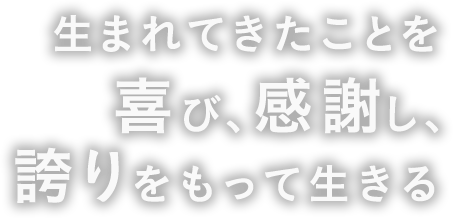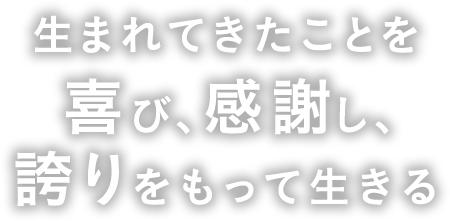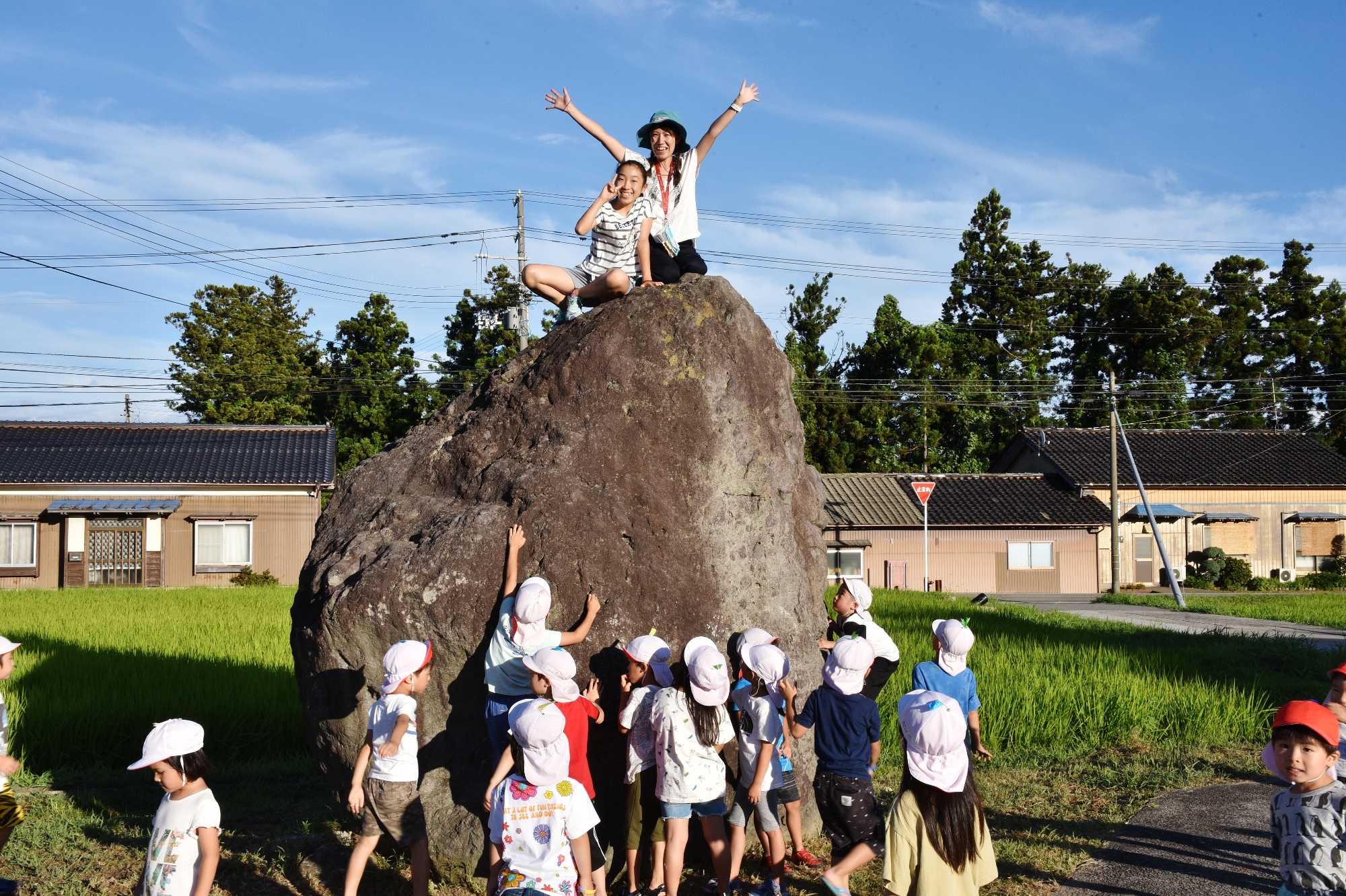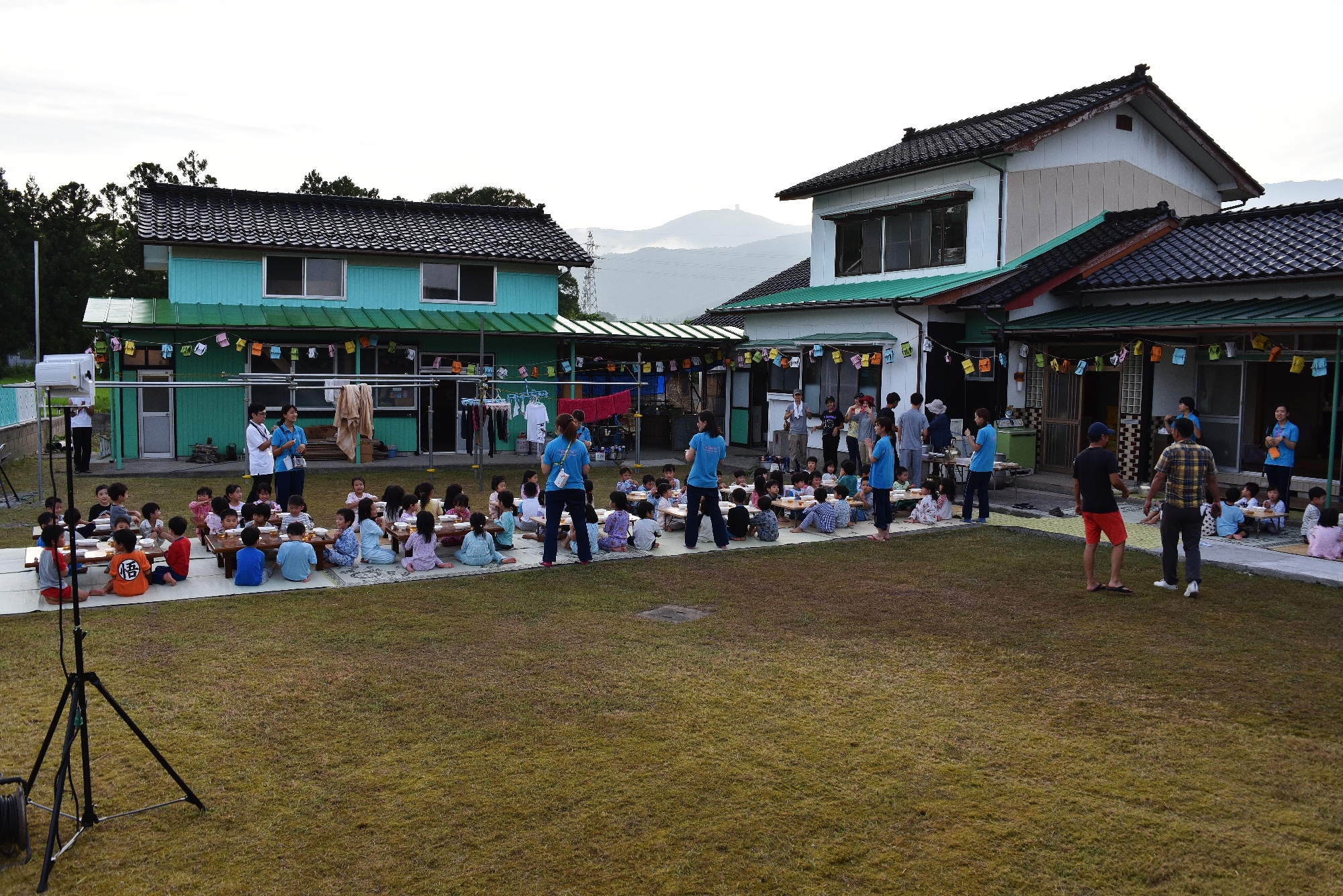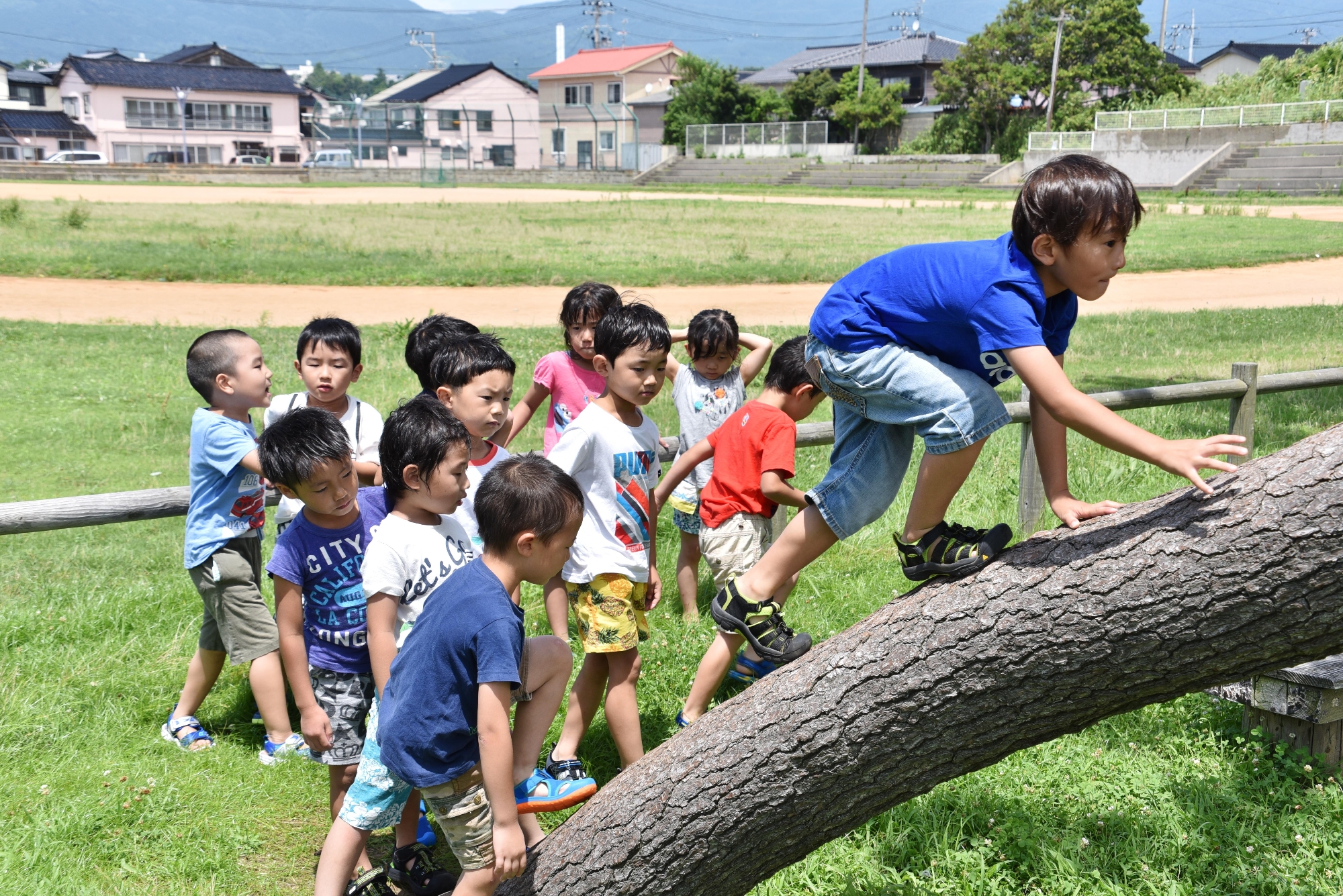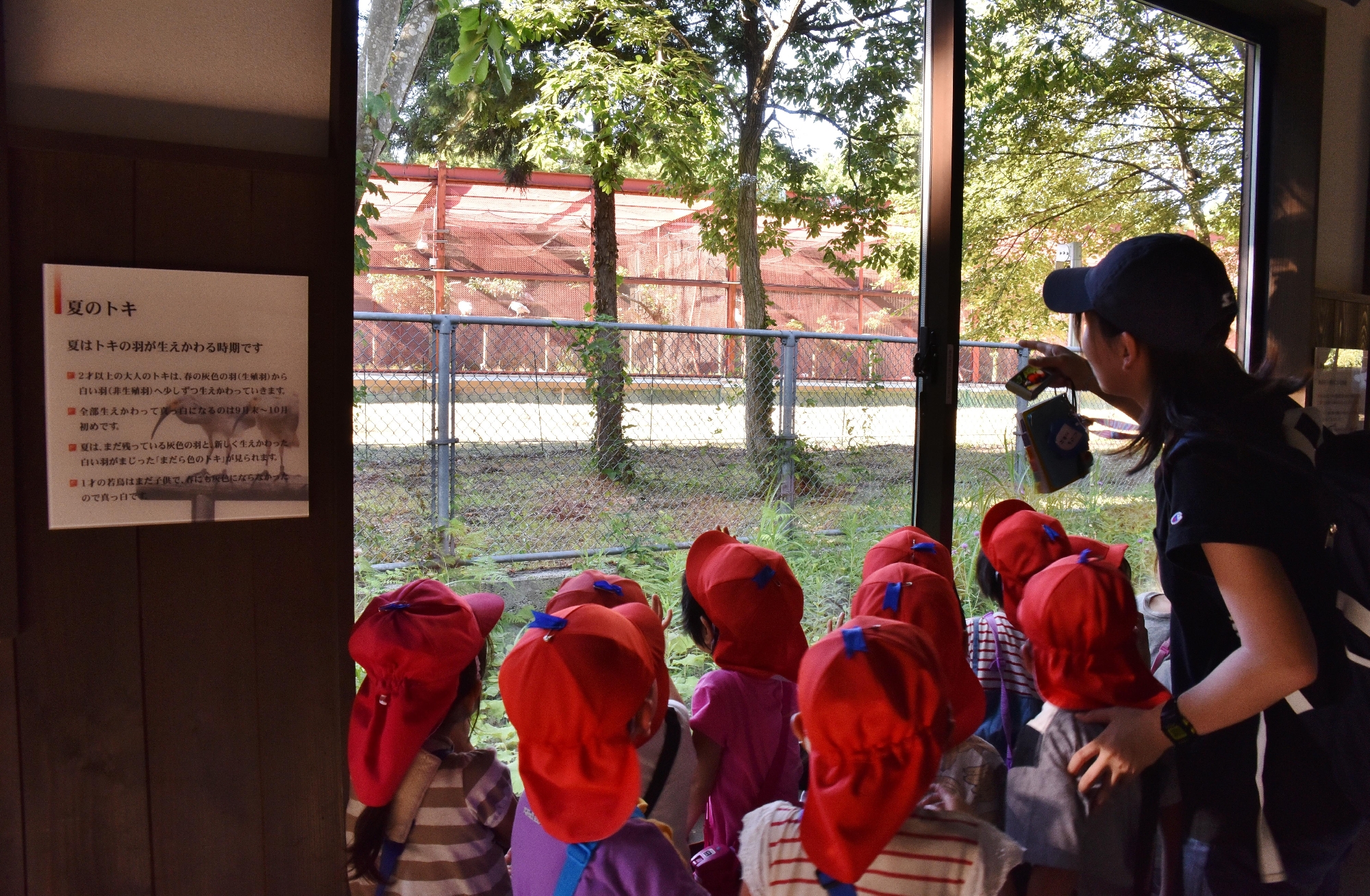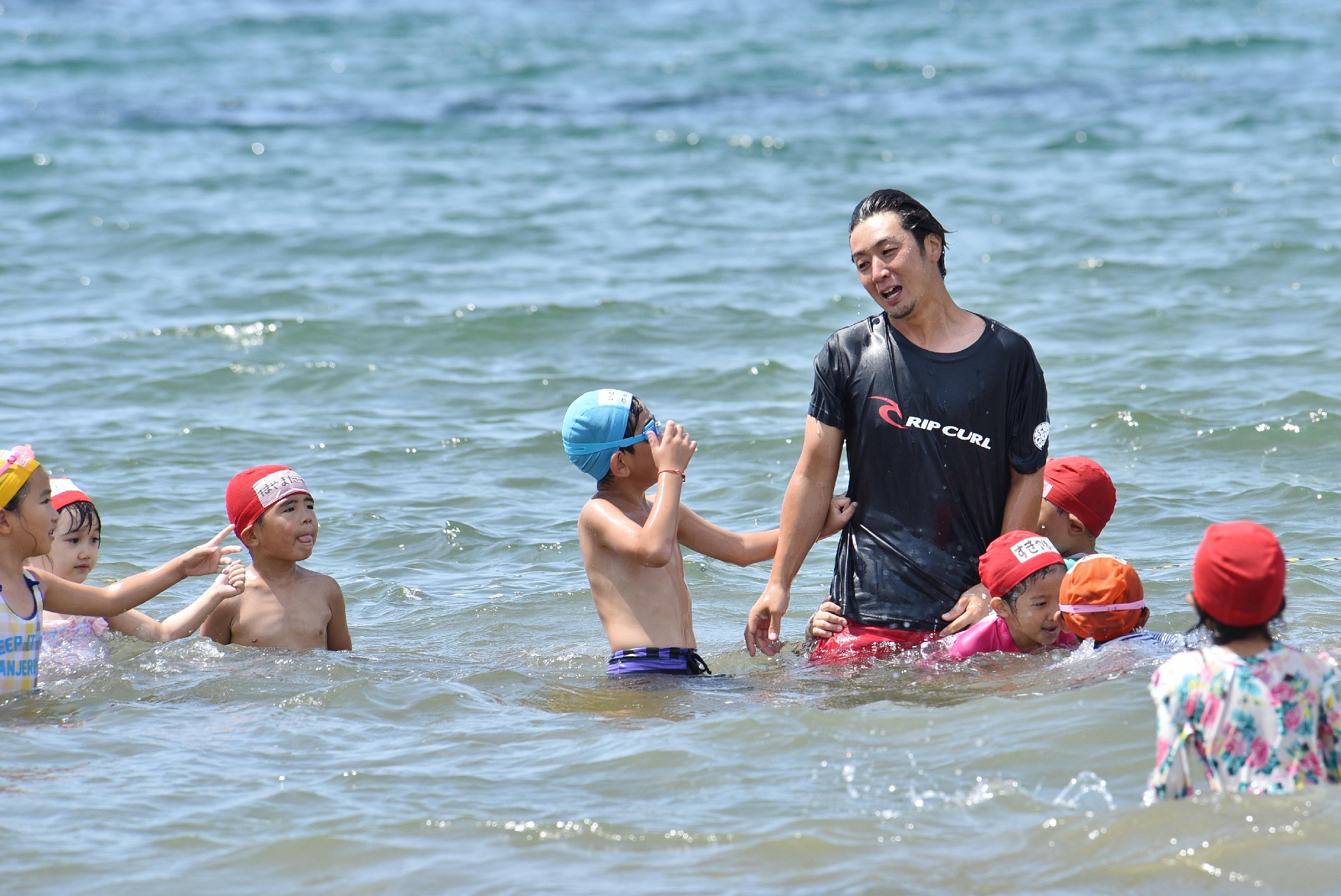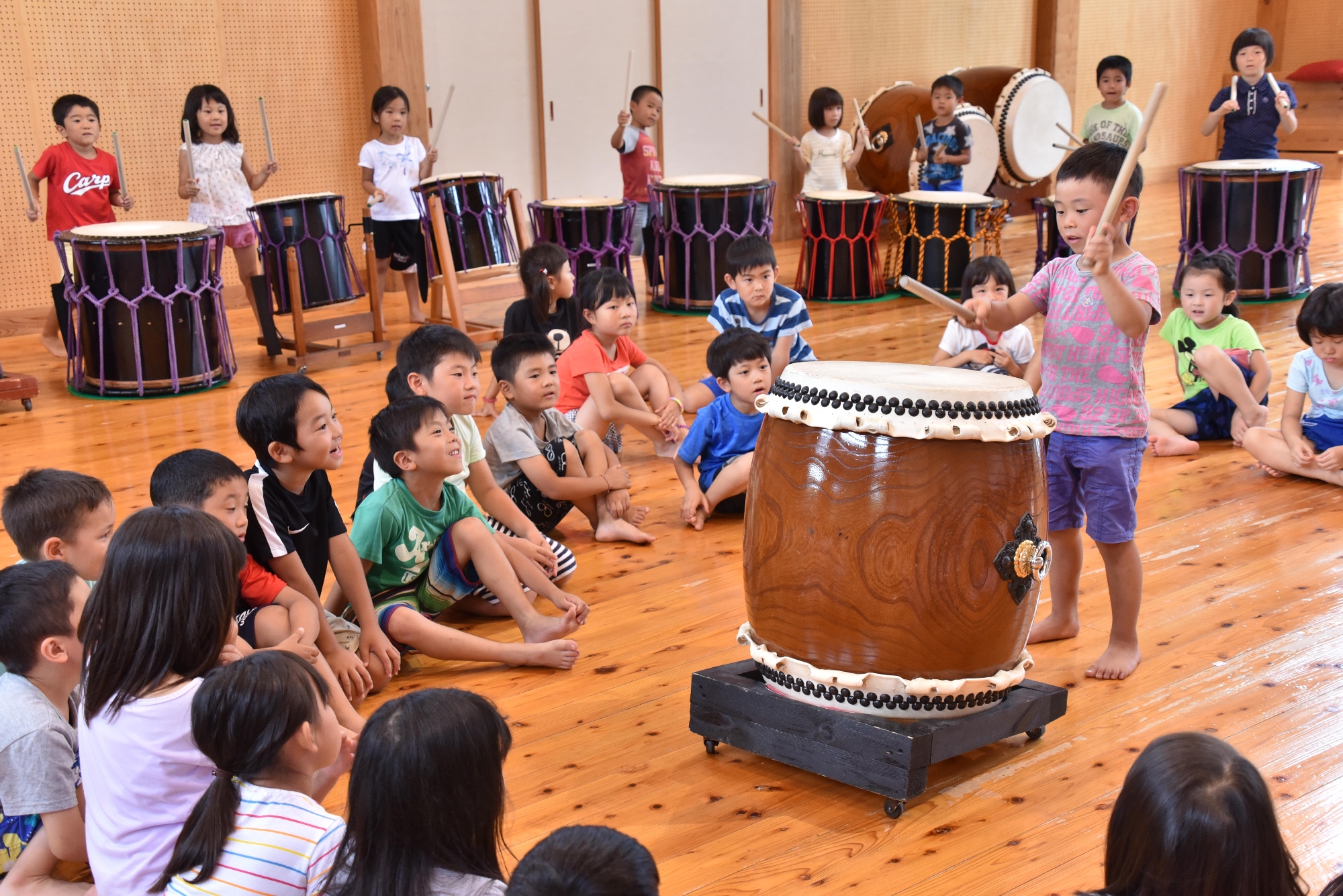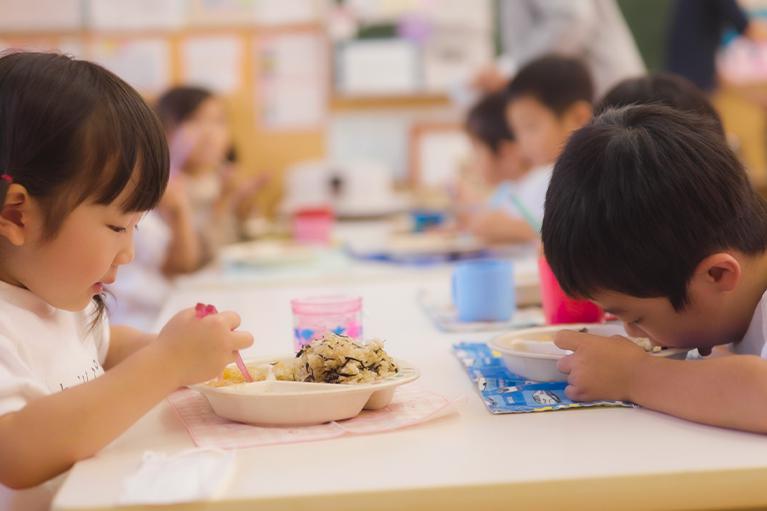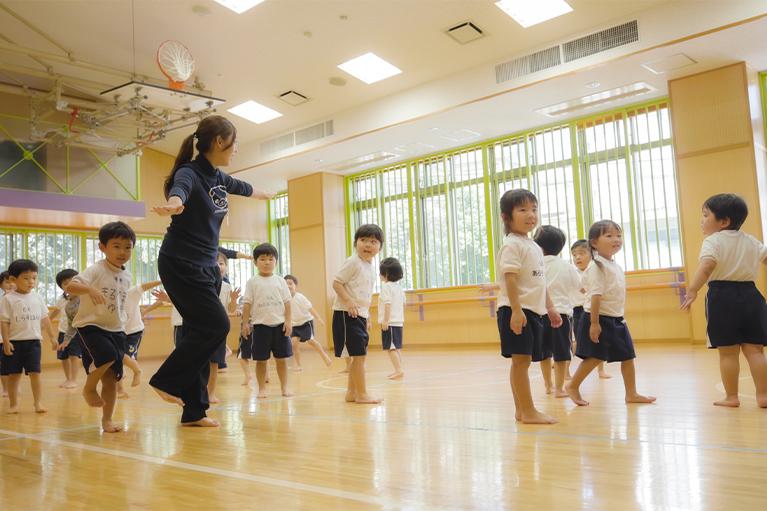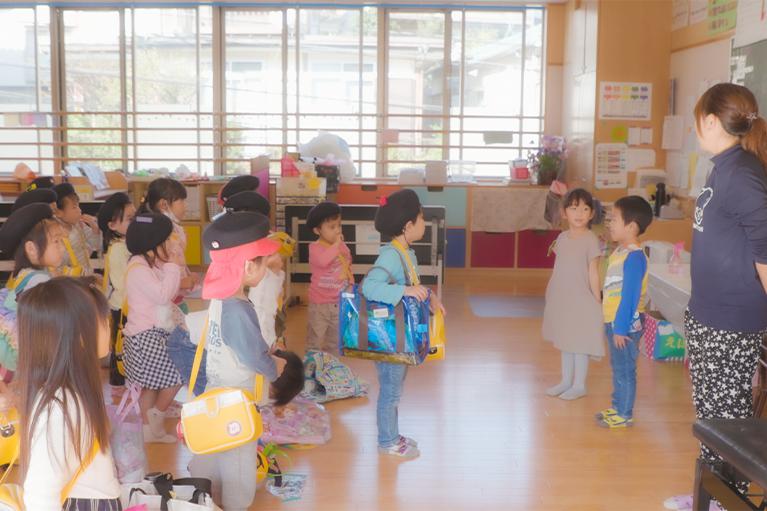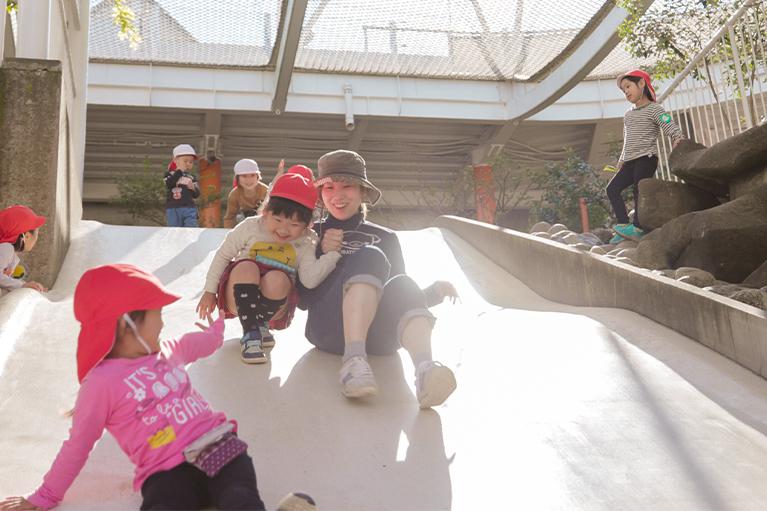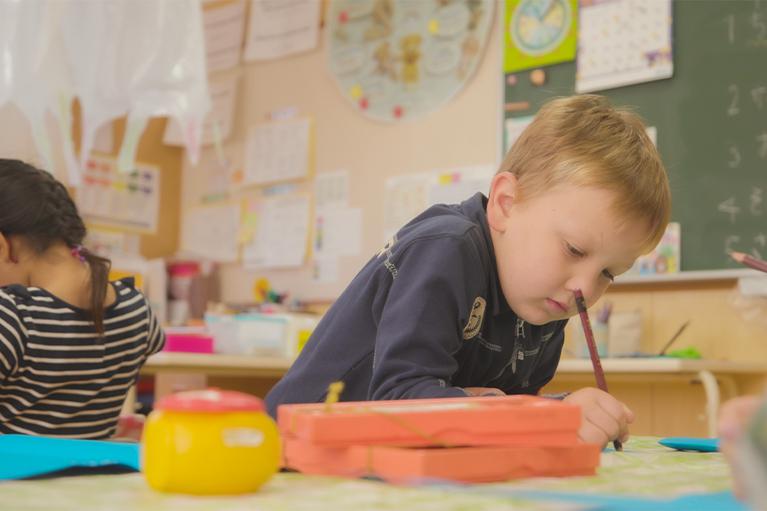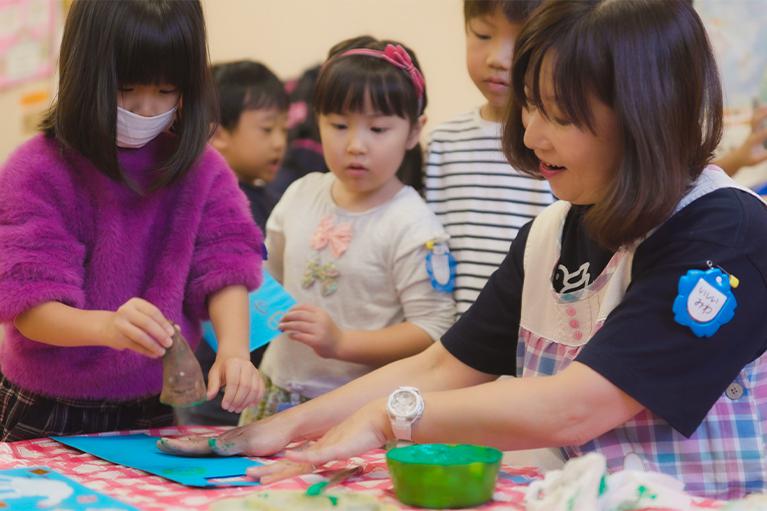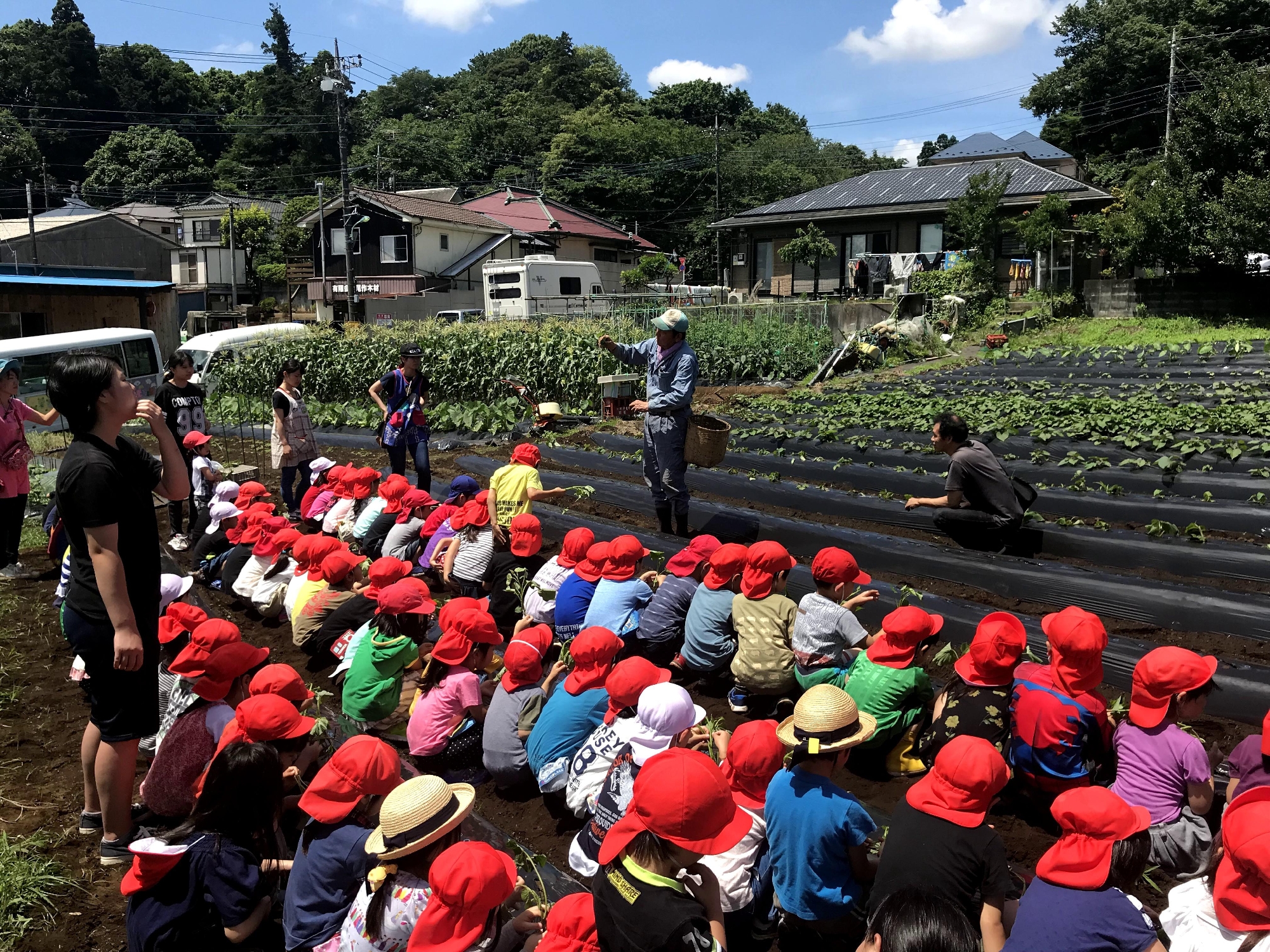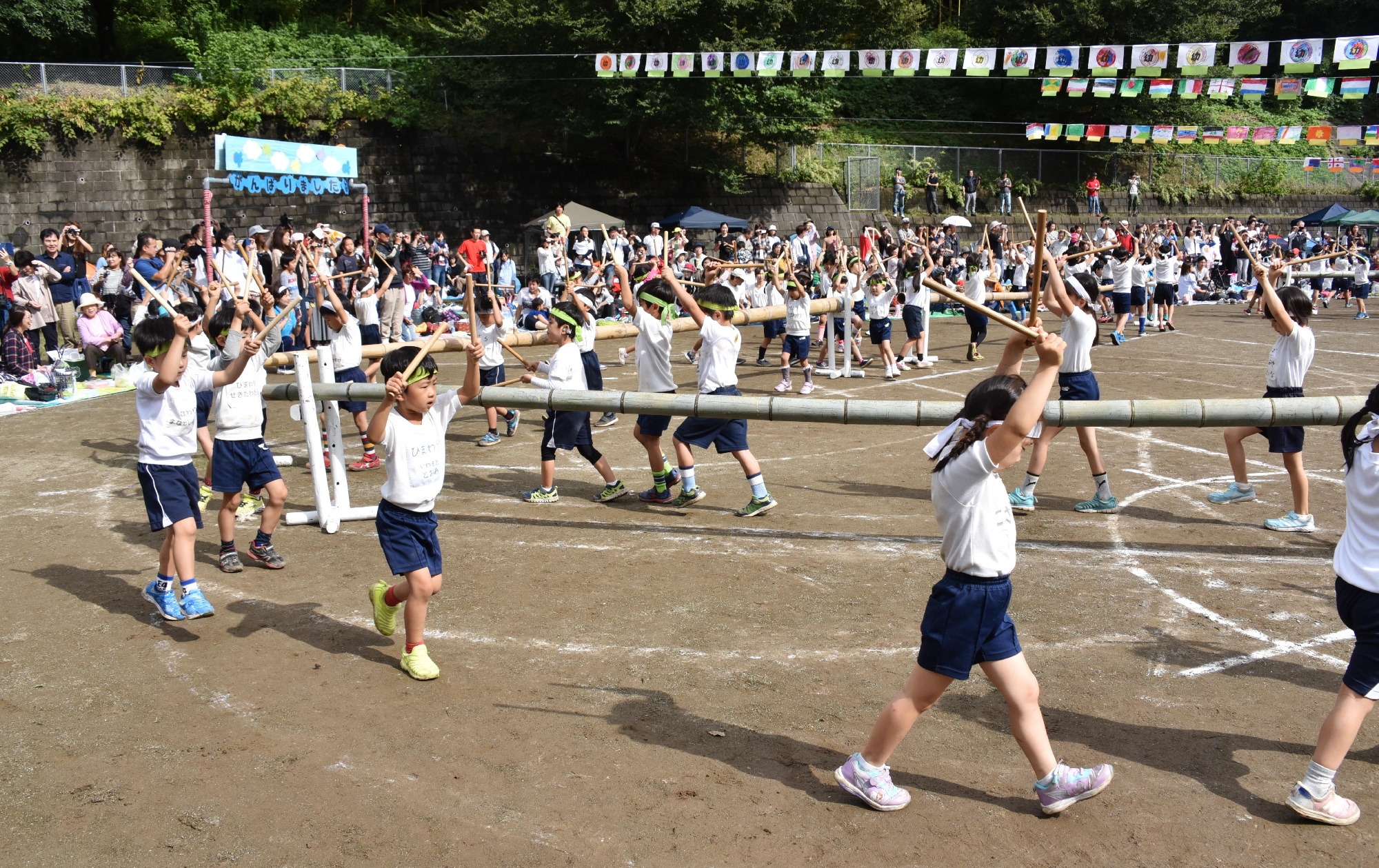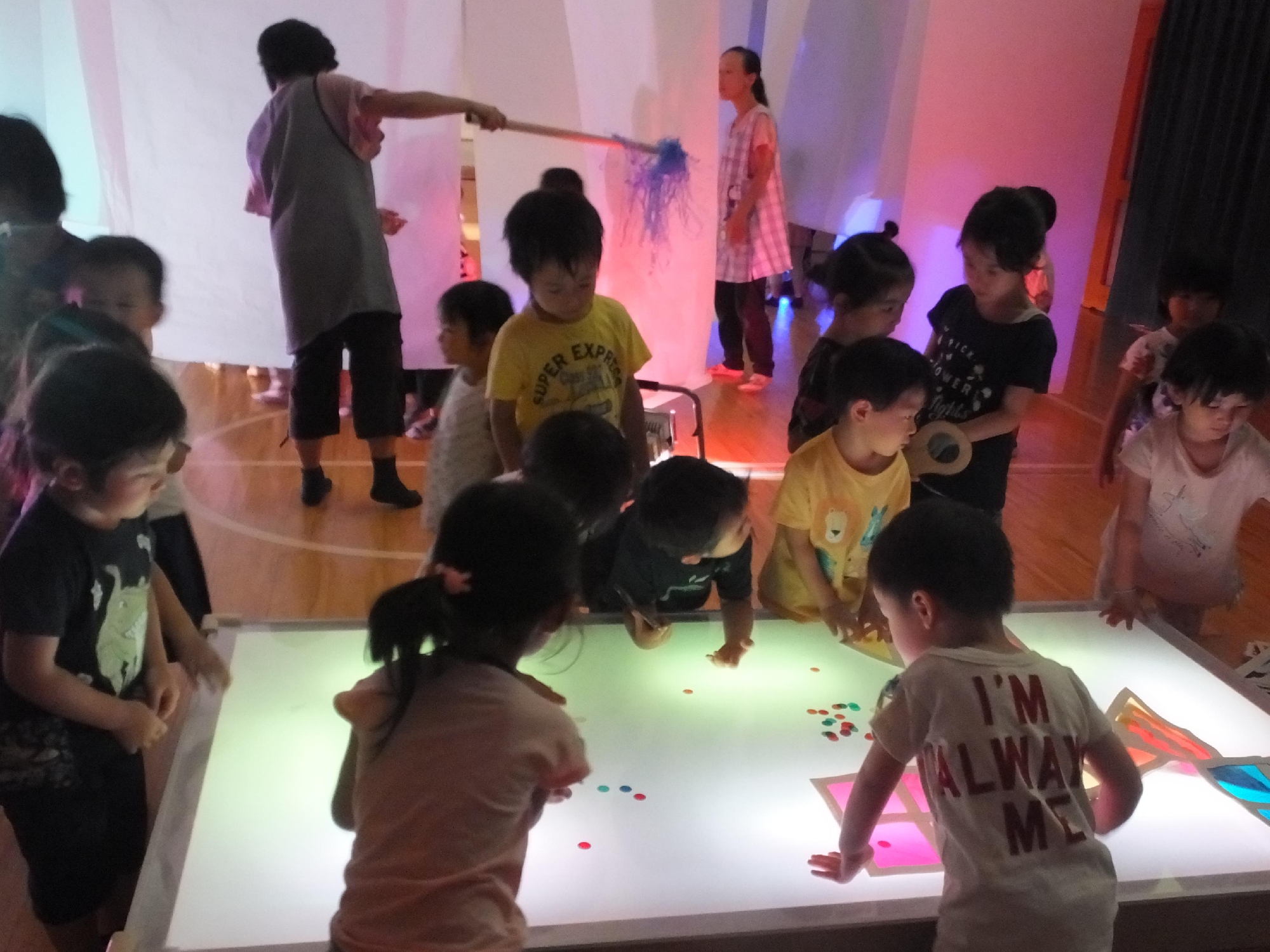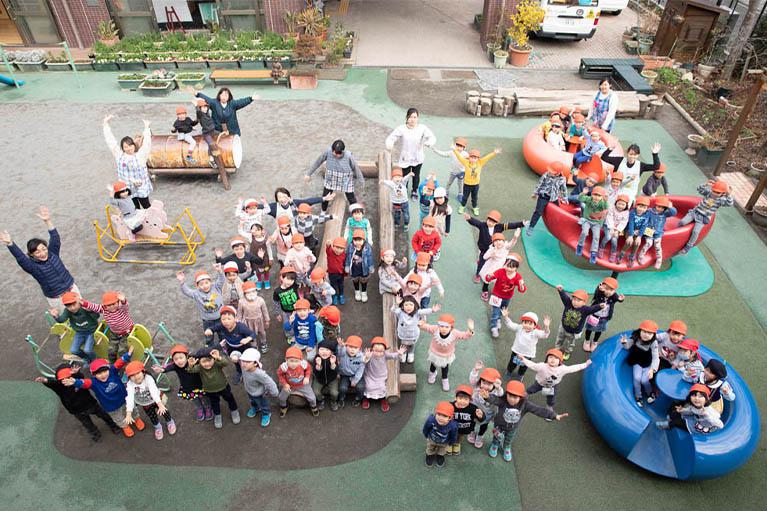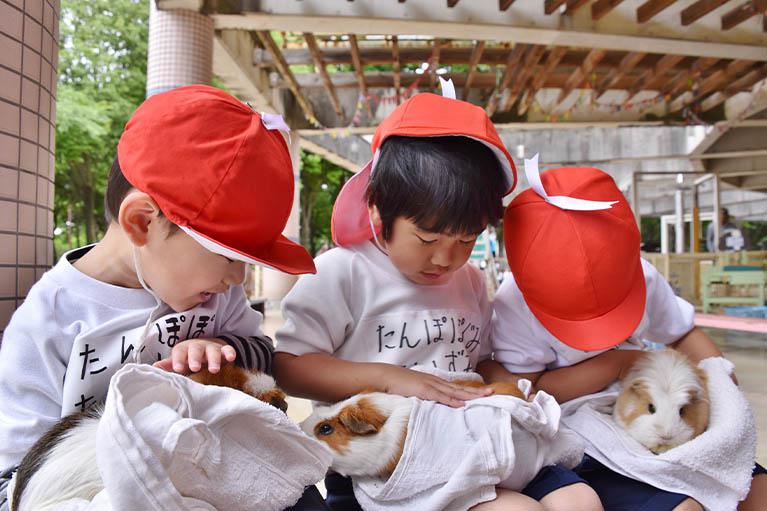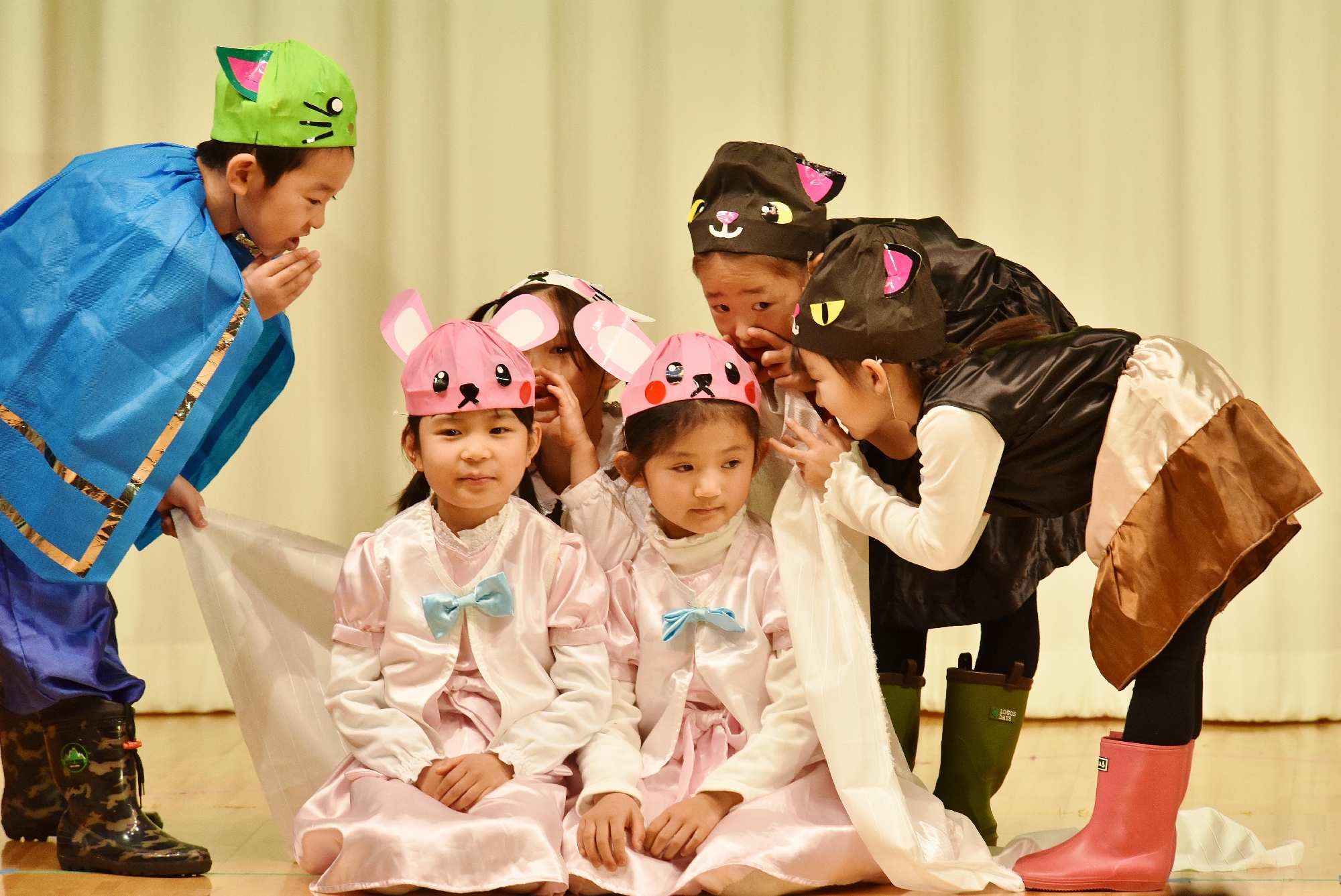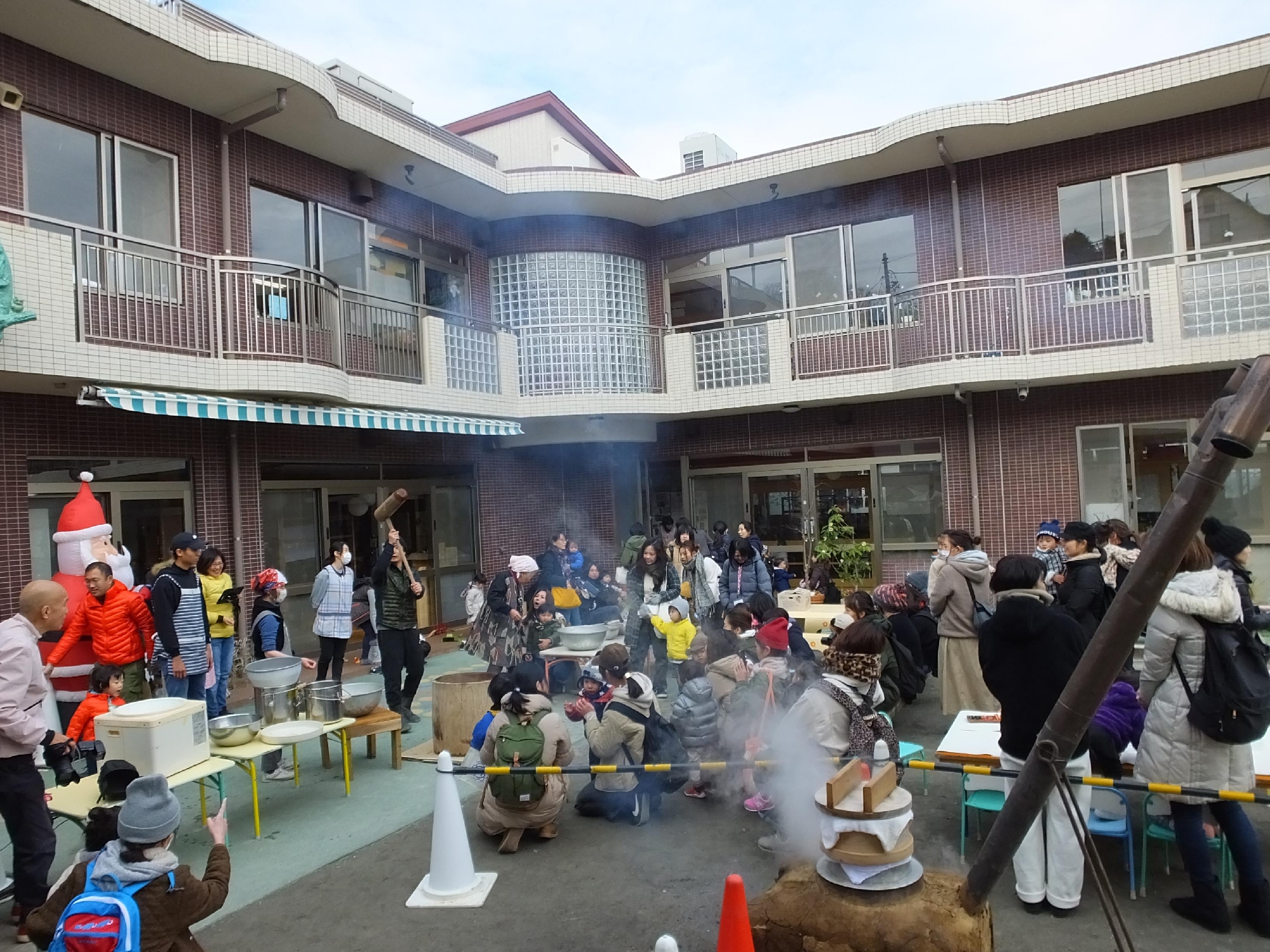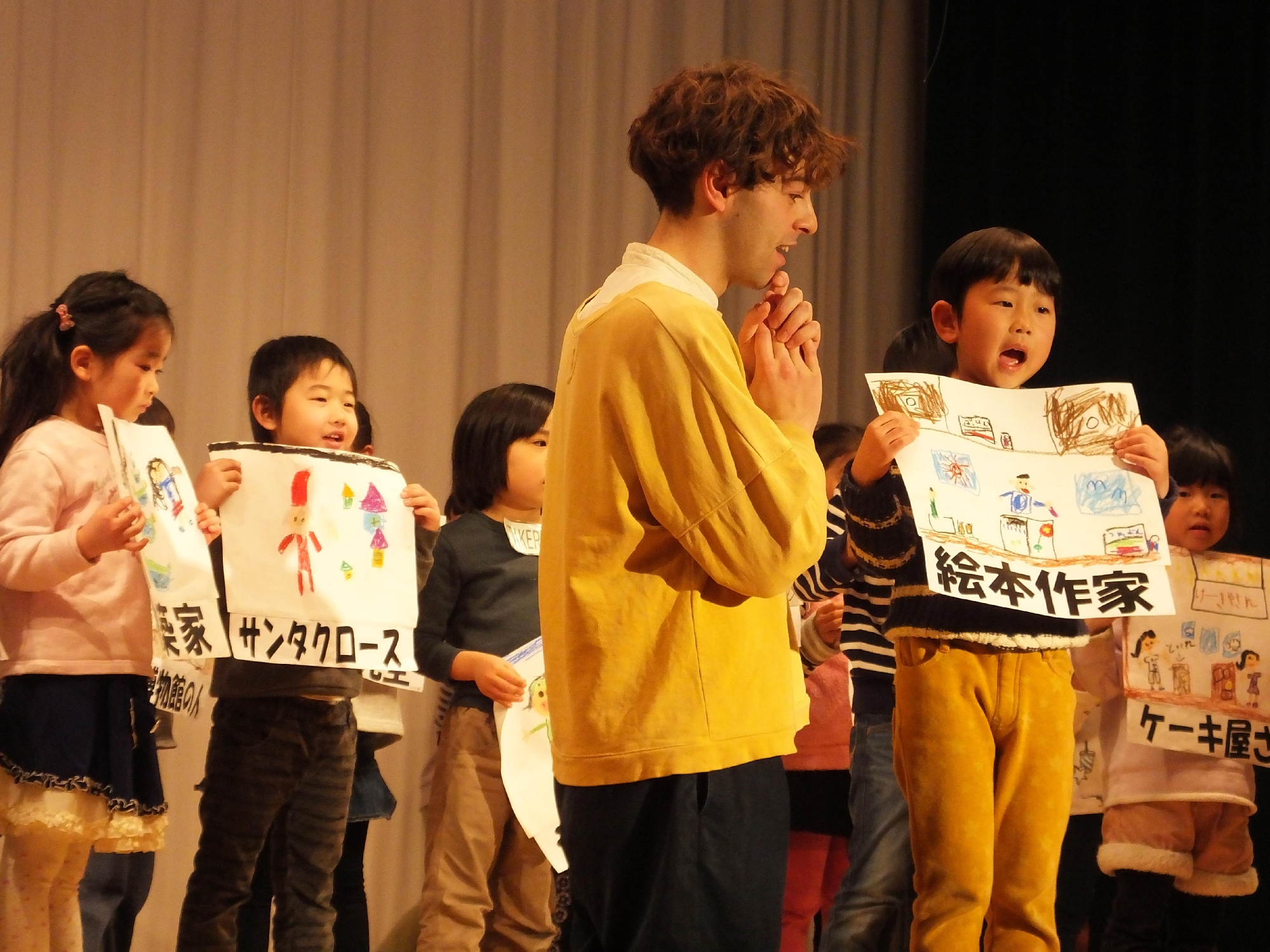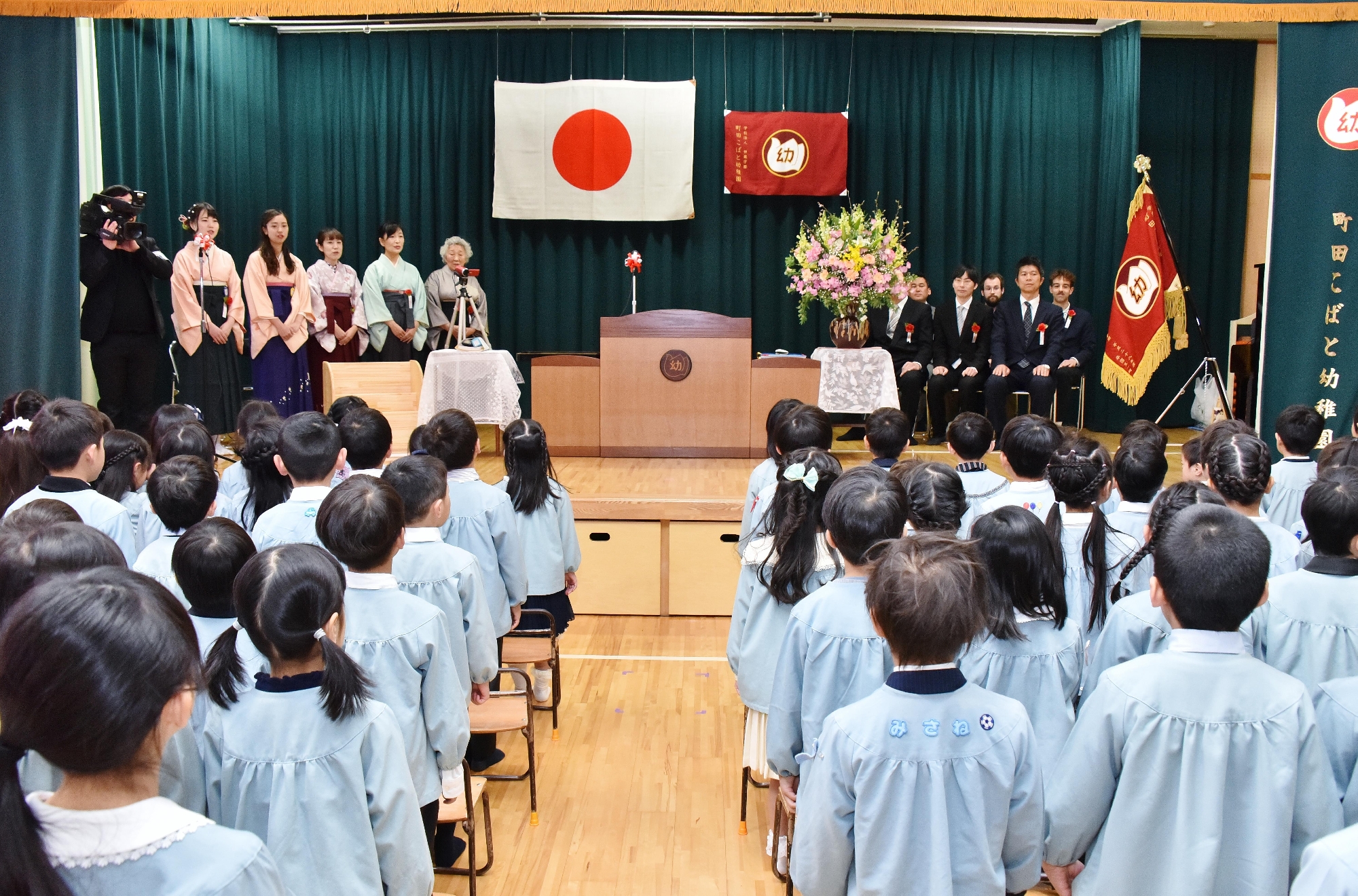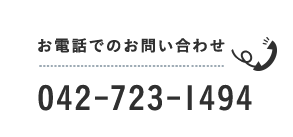- HOME >
- 教育内容
教育内容 What we offer

教育の特色 Features of our education
町田こばと幼稚園の教育の特色をご紹介します。
Following is the features of our education at Machida Kobato Kindergarten.
Following is the features of our education at Machida Kobato Kindergarten.
主体性を大切にします
We encourage children initiated learning.
多様な経験を通して、自ら考え解決方法を導き出す力を育んでほしい。
それがわたしたちの願いです。
子ども達が自分で考え、自分で工夫して遊ぶ「自由遊び」を大切にし、クラス単位での一斉教育との適切なバランスのもとで、生き生きと積極的に「せかい」とかかわり、思いやりを持って行動できる子どもの育成を目指しています。
Through various experience, we would like to nurture the skills to look for the solutions and to solve problems they may face. That’s what we wish.
We take “free play” which comes from children’s natural curiosity and enthusiasm important, for children to be actively involved with the world around them, and to become active, compassionate and lifelong learners who understand that other people, with their differences, can also be right.
それがわたしたちの願いです。
子ども達が自分で考え、自分で工夫して遊ぶ「自由遊び」を大切にし、クラス単位での一斉教育との適切なバランスのもとで、生き生きと積極的に「せかい」とかかわり、思いやりを持って行動できる子どもの育成を目指しています。
Through various experience, we would like to nurture the skills to look for the solutions and to solve problems they may face. That’s what we wish.
We take “free play” which comes from children’s natural curiosity and enthusiasm important, for children to be actively involved with the world around them, and to become active, compassionate and lifelong learners who understand that other people, with their differences, can also be right.
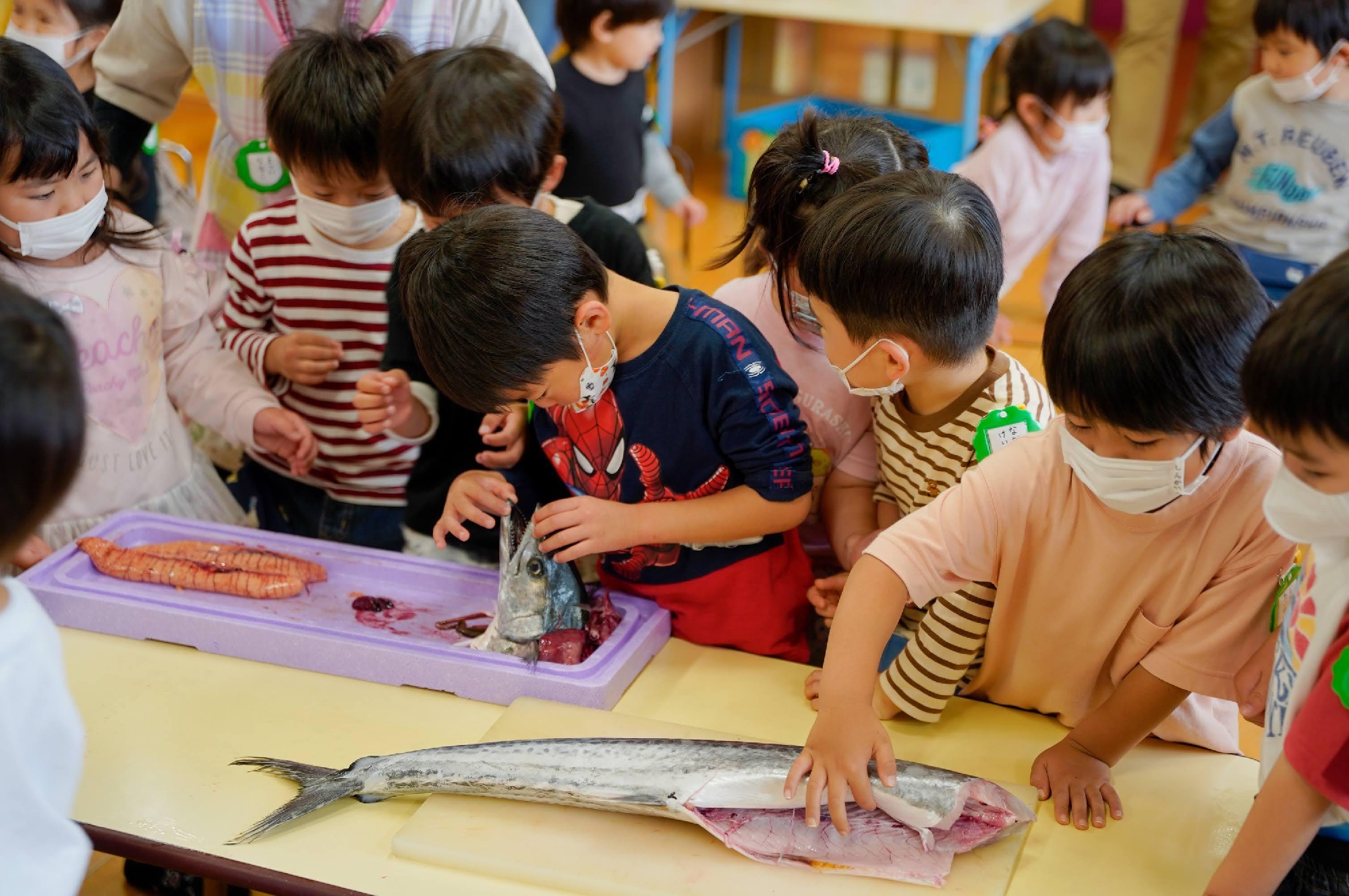
幼稚園は、「元気」を育てる自由な遊び場です
Kindergarten is the place to develop "energeticness"
子どもの生活の主軸は遊びです。
お友達と交わり、外気に触れ、体を動かして遊ぶ経験を通して、こころも体も成長していきます。
自由な遊びの中で、時には転んだり、危ないことに出会うかもしれませんし、お友達とけんかになるかもしれません。しかし、そういった経験の中には、様々な気付きがあります。
それらの経験を通して初めて、子どもたちは、何が危険かを知り危険を避けるすべを知り、さらに、相手の痛みがわかるようになるのです。子どもはこのようなことの繰り返しで成長していきます。転ぶことを恐れて走ることをやめさせてしまったら、子どもたちの成長の道は閉ざされてしまいます。
子どもたちが自由に遊べる場所が減ってきている時代だからこそ、町田こばと幼稚園は、保護者の皆さまとの厚い連携のもと、「元気」を育む自由な遊び場でありたいと考えています。
At Kobato, we take spontaneous play (inside and outside free play) which comes from children's natural curiosity and enthusiasm important, and taking a good balance with the regular classes for active and enthusiastic education and care. Main activity of children’s everyday life is to play. Children grow body and soul through the experience of free play; the relationships with friends, exposing to the outside air, and moving bodies. Knowledge, emotion, mind, and social skills, a lot of the living skills are developed through plays.
They may encounter some dangerous moments. They may start quarrel and fighting with friends. But those experiences contain lessons they need to learn. And they get chances to know the dangers, how to avoid the dangers, and they get to know the pains of others.
“It is okay to fall down and cry, but we want them to rise to their feet and start running again. When the second time comes, they may be able to rise without crying. When the third time comes, they might tremble but not fall, get balanced again and keep running.” Children grow up like that. If we fear the failures and stop them running, their process of growing up will be shut down.
Spaces for children to play are decreasing these days, and that is especially why Machida Kobato needs to be the place for them to play freely to develop energeticness, with the tight cooperation with parents.
お友達と交わり、外気に触れ、体を動かして遊ぶ経験を通して、こころも体も成長していきます。
自由な遊びの中で、時には転んだり、危ないことに出会うかもしれませんし、お友達とけんかになるかもしれません。しかし、そういった経験の中には、様々な気付きがあります。
それらの経験を通して初めて、子どもたちは、何が危険かを知り危険を避けるすべを知り、さらに、相手の痛みがわかるようになるのです。子どもはこのようなことの繰り返しで成長していきます。転ぶことを恐れて走ることをやめさせてしまったら、子どもたちの成長の道は閉ざされてしまいます。
子どもたちが自由に遊べる場所が減ってきている時代だからこそ、町田こばと幼稚園は、保護者の皆さまとの厚い連携のもと、「元気」を育む自由な遊び場でありたいと考えています。
At Kobato, we take spontaneous play (inside and outside free play) which comes from children's natural curiosity and enthusiasm important, and taking a good balance with the regular classes for active and enthusiastic education and care. Main activity of children’s everyday life is to play. Children grow body and soul through the experience of free play; the relationships with friends, exposing to the outside air, and moving bodies. Knowledge, emotion, mind, and social skills, a lot of the living skills are developed through plays.
They may encounter some dangerous moments. They may start quarrel and fighting with friends. But those experiences contain lessons they need to learn. And they get chances to know the dangers, how to avoid the dangers, and they get to know the pains of others.
“It is okay to fall down and cry, but we want them to rise to their feet and start running again. When the second time comes, they may be able to rise without crying. When the third time comes, they might tremble but not fall, get balanced again and keep running.” Children grow up like that. If we fear the failures and stop them running, their process of growing up will be shut down.
Spaces for children to play are decreasing these days, and that is especially why Machida Kobato needs to be the place for them to play freely to develop energeticness, with the tight cooperation with parents.
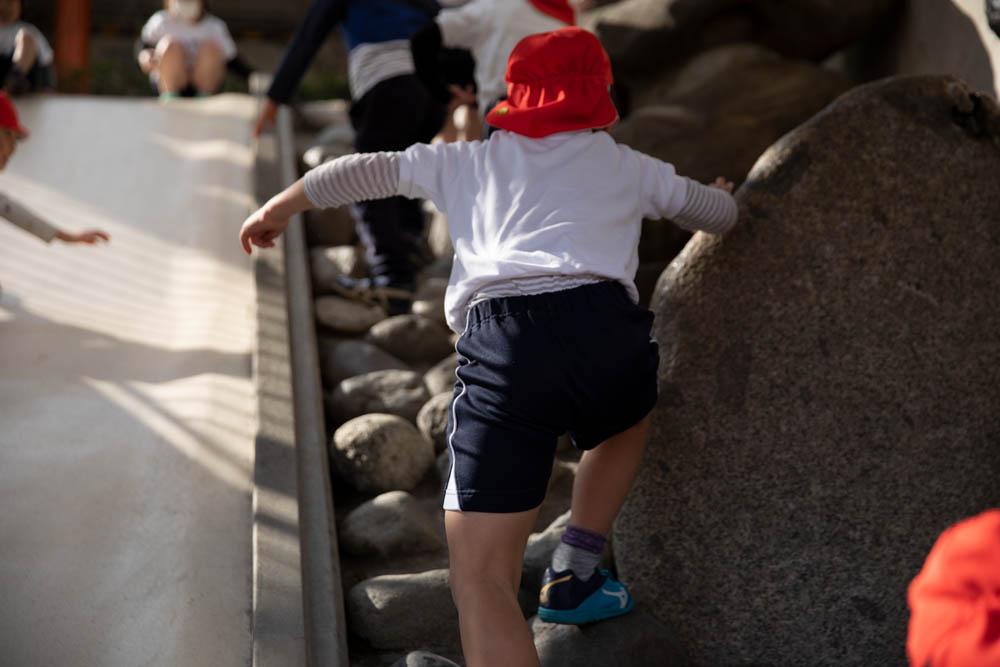
国際バカロレア教育(IB)認定校 Authorised IB World School
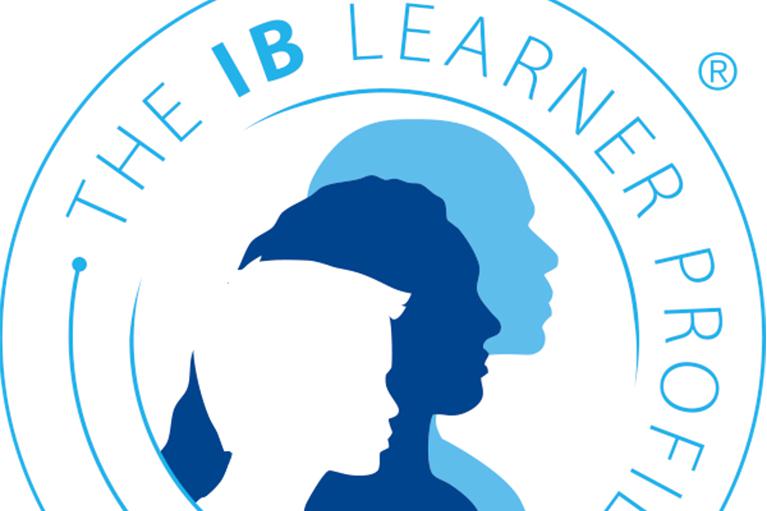
1966年創立、50年以上にわたり幼児教育に携わる学校法人神蔵学園「町田こばと幼稚園」は、設立当初より、「多様な経験」を通して、未来を「生き抜く力」を育むこと)を理念とし、地域の教育活動に貢献してきました。
2019年3月18日、「町田こばと幼稚園」は、長年の業績に裏打ちされた幼児教育プログラムが認められ、国際バカロレア(IB)プライマリーイヤーズプログラム(PYP)認定校となりました。
Since it was founded in 1966, “Machida Kobato Kindergarten” has been providing early childhood education and care to contribute to the education that promotes <”active-learning” from which the children will gain “positive attitudes towards problem-solving and living together”> for the region for over 50 years. And on the 18th March 2019, our long contribution of childhood education programme has been recognized and we became an authorized Primary Years Programme (PYP) IB (International Baccalaureate) World School. We became the first kindergarten in metropolitan Tokyo certified both by IB and the Japanese government*, and the third such facility nationwide. *Certified by the Japanese government: Schools defined as primarily legitimated schools Article 1 of the School Education Act
2019年3月18日、「町田こばと幼稚園」は、長年の業績に裏打ちされた幼児教育プログラムが認められ、国際バカロレア(IB)プライマリーイヤーズプログラム(PYP)認定校となりました。
Since it was founded in 1966, “Machida Kobato Kindergarten” has been providing early childhood education and care to contribute to the education that promotes <”active-learning” from which the children will gain “positive attitudes towards problem-solving and living together”> for the region for over 50 years. And on the 18th March 2019, our long contribution of childhood education programme has been recognized and we became an authorized Primary Years Programme (PYP) IB (International Baccalaureate) World School. We became the first kindergarten in metropolitan Tokyo certified both by IB and the Japanese government*, and the third such facility nationwide. *Certified by the Japanese government: Schools defined as primarily legitimated schools Article 1 of the School Education Act
専科 Specialty classes
スイミング Swimming
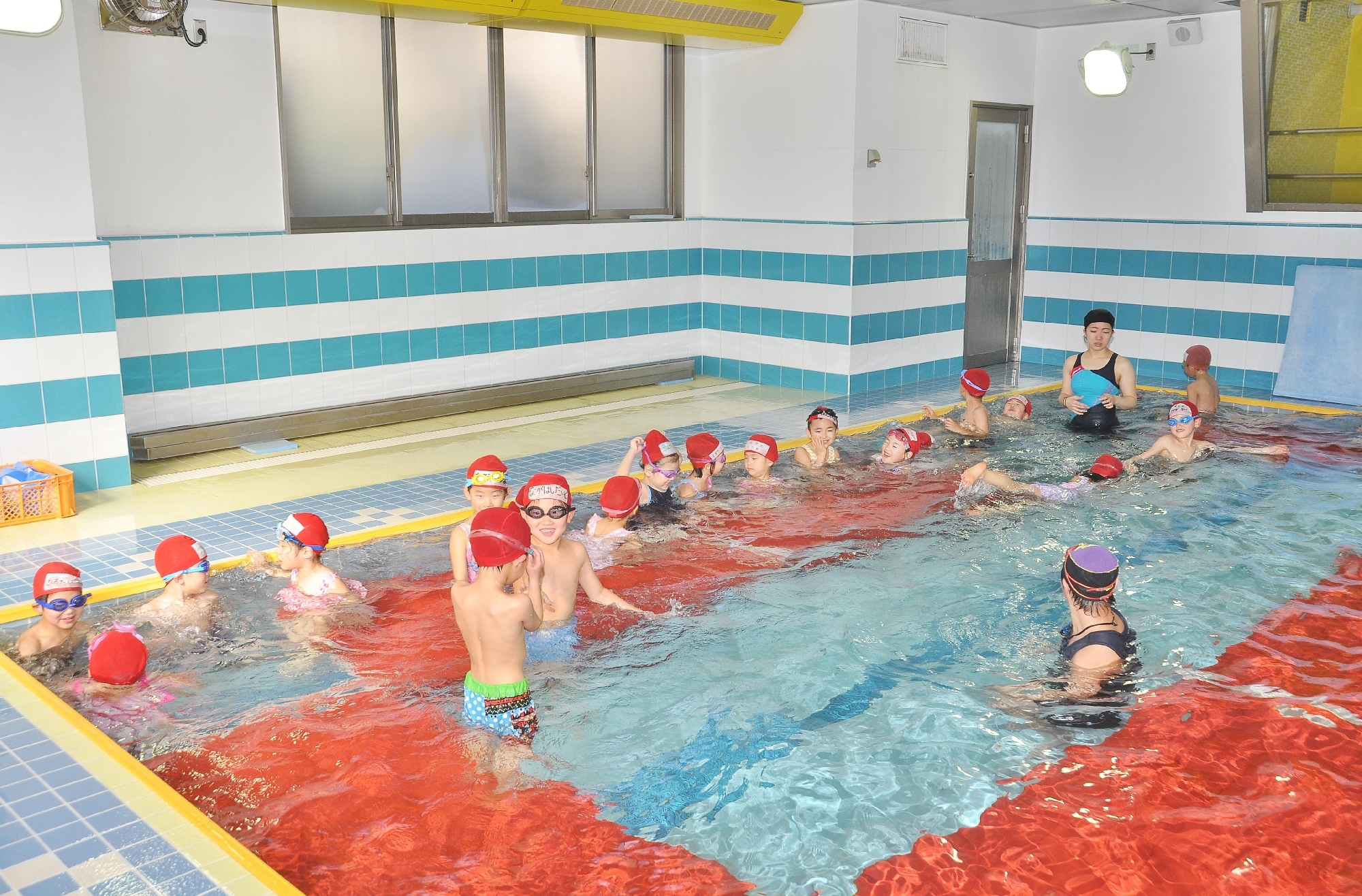
園内の屋内温水プールで、専任教諭による指導を年少より週一回、年間通して行います。幼児期から積極的に水に接することによって、水への恐怖を取りのぞきつよい体の基礎を作るとともに、何事にも挑戦していく心を育てます。初めは水を怖がった子どもも、顔をつけられるようになった、もぐれるようになったなど、段階を経るにつれ、いきいきとした笑顔を見せるようになります。卒園までに水に浮き、泳げるようになることを目標にしています。真夏(7月)は屋外にプールを設置して、太陽のもとで水遊びを楽しみます。
We have weekly swimming class with our PE teacher in our indoor heated swimming pool throughout a year from Nensho (K1). Having opportunities actively involved with water from early childhood to dispel the fears of water and to make the basis of strong body, as well as nurturing a strong heart to challenge with all the thing they may face. With children who were fearing water at first, gradually becoming able to put the face in the water, then dive under the water, and as going through the growing process, they begin to show bright happy faces. We are targeting to be able to float, and to swim by the time of graduation. During mid summer, we have pools outside and enjoy playing with water under the sun.
We have weekly swimming class with our PE teacher in our indoor heated swimming pool throughout a year from Nensho (K1). Having opportunities actively involved with water from early childhood to dispel the fears of water and to make the basis of strong body, as well as nurturing a strong heart to challenge with all the thing they may face. With children who were fearing water at first, gradually becoming able to put the face in the water, then dive under the water, and as going through the growing process, they begin to show bright happy faces. We are targeting to be able to float, and to swim by the time of graduation. During mid summer, we have pools outside and enjoy playing with water under the sun.
英語活動 English
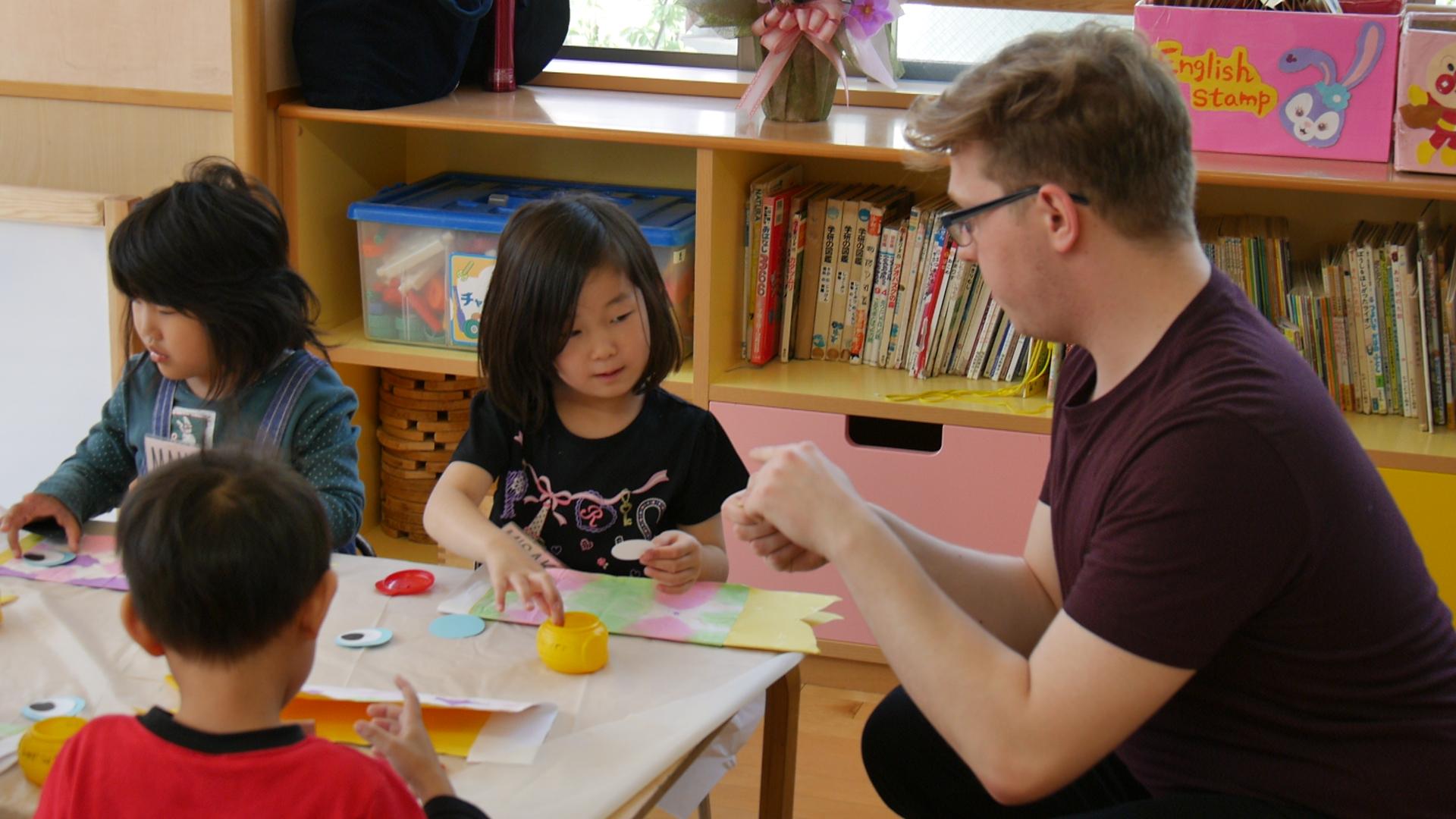
平世界中の人たちと、言葉で伝えあい、共感し、思いやりのある行動がとれるように、平成8年度から保育の中に英語教育を取り入れています。
私達が知らず知らずのうちの日本語を習得したように、聴覚や言語中枢が固まってしまわない幼児期に、英語を母語とする講師が複数名で保育にかかわることで、単語を記憶するだけでなく、インプットしたセンテンスを使いたいときに表現できるアウトプットの環境を整えています。0歳から通える園庭開放(ガーデンクラス)や、2歳児クラスからの経験を積み重ね、『生きている英語』を聞き取り、『使える英語』を身につけることができます。
At Machida Kobato, we started implementing English education in the classes since 1996 (8th Heisei) for children to be able to communicate verbally ,empathise with each other and act compassionately. We are hoping children to learn and get familiar with English while their brain is best able to absorb language, through plays in everyday life just as we all have acquired the Japanese (mother) language.
By associating with several experienced native English teaching experts together, not only memorizing words but also we have opportunities and environments for output as well as receiving inputs of phrases and sentences. We also have Garden Class (pre-K open playground) for 0 year old and over, and by accumulating experiences from 2 year old class to be exposed to “Live English language”, and acquire “Useful English”.
私達が知らず知らずのうちの日本語を習得したように、聴覚や言語中枢が固まってしまわない幼児期に、英語を母語とする講師が複数名で保育にかかわることで、単語を記憶するだけでなく、インプットしたセンテンスを使いたいときに表現できるアウトプットの環境を整えています。0歳から通える園庭開放(ガーデンクラス)や、2歳児クラスからの経験を積み重ね、『生きている英語』を聞き取り、『使える英語』を身につけることができます。
At Machida Kobato, we started implementing English education in the classes since 1996 (8th Heisei) for children to be able to communicate verbally ,empathise with each other and act compassionately. We are hoping children to learn and get familiar with English while their brain is best able to absorb language, through plays in everyday life just as we all have acquired the Japanese (mother) language.
By associating with several experienced native English teaching experts together, not only memorizing words but also we have opportunities and environments for output as well as receiving inputs of phrases and sentences. We also have Garden Class (pre-K open playground) for 0 year old and over, and by accumulating experiences from 2 year old class to be exposed to “Live English language”, and acquire “Useful English”.
リズム Rhythm
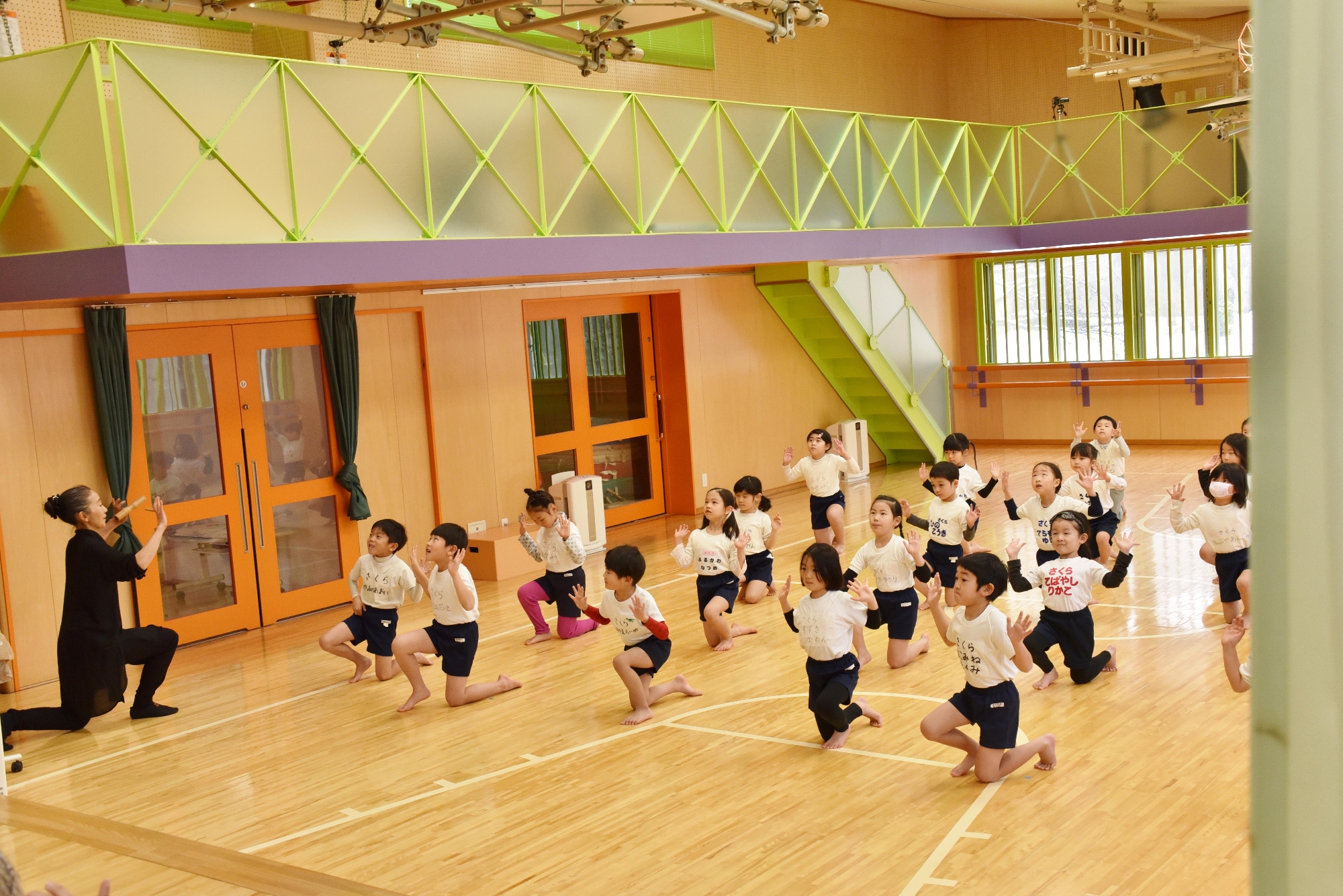
「リトミック」と「ダンス」の要素を取り入れた身体表現のクラスです。音楽に合わせて体を動かすことは、脳の発達を促すとともに情緒面の発達にも深く関わっているといわれています。リズムの時間は、楽しく体を動かしながらリズム感、音感、集中力、自由に表現する力、敏捷性、柔軟性などを養います。
リトルルームから年少、年中、年長の4年間、専任教諭の一貫した指導を受けることで、「継続は力なり」の言葉通り、年長の3学期には、手と足が別々のリズムを表現する等の高度なリズム表現に加えて、積極的な自己表現力が身に付いてきます。
また、お友達と気持ちを合わせて一緒に動いていくことによって、相手を思いやる力やコミュニケーション力も育成されます。
“Rhythm class” is an physical expression class adopting elements of “Eurythmics” and “Dance”. It’s been said that making body movements and listening to music, enhances the brain development and is also deeply related with emotional development.
In this class, we are to cultivate sense of rhythm and music, concentration, skills to express freely, agility, flexibility and etc. Children take the lessons consistently for 4 years starting from Little Room (Pre-K Class) through Nensho (K1), Nenchu (K2) to Nencho (K3) by our dance teacher, and by the last term of Nencho grade, they are able to make different movements with arms and legs, as well as expressing themselves actively.
It also develops caring others and communication skills by making movements together with friends.
リトルルームから年少、年中、年長の4年間、専任教諭の一貫した指導を受けることで、「継続は力なり」の言葉通り、年長の3学期には、手と足が別々のリズムを表現する等の高度なリズム表現に加えて、積極的な自己表現力が身に付いてきます。
また、お友達と気持ちを合わせて一緒に動いていくことによって、相手を思いやる力やコミュニケーション力も育成されます。
“Rhythm class” is an physical expression class adopting elements of “Eurythmics” and “Dance”. It’s been said that making body movements and listening to music, enhances the brain development and is also deeply related with emotional development.
In this class, we are to cultivate sense of rhythm and music, concentration, skills to express freely, agility, flexibility and etc. Children take the lessons consistently for 4 years starting from Little Room (Pre-K Class) through Nensho (K1), Nenchu (K2) to Nencho (K3) by our dance teacher, and by the last term of Nencho grade, they are able to make different movements with arms and legs, as well as expressing themselves actively.
It also develops caring others and communication skills by making movements together with friends.
体操 Gymnastics
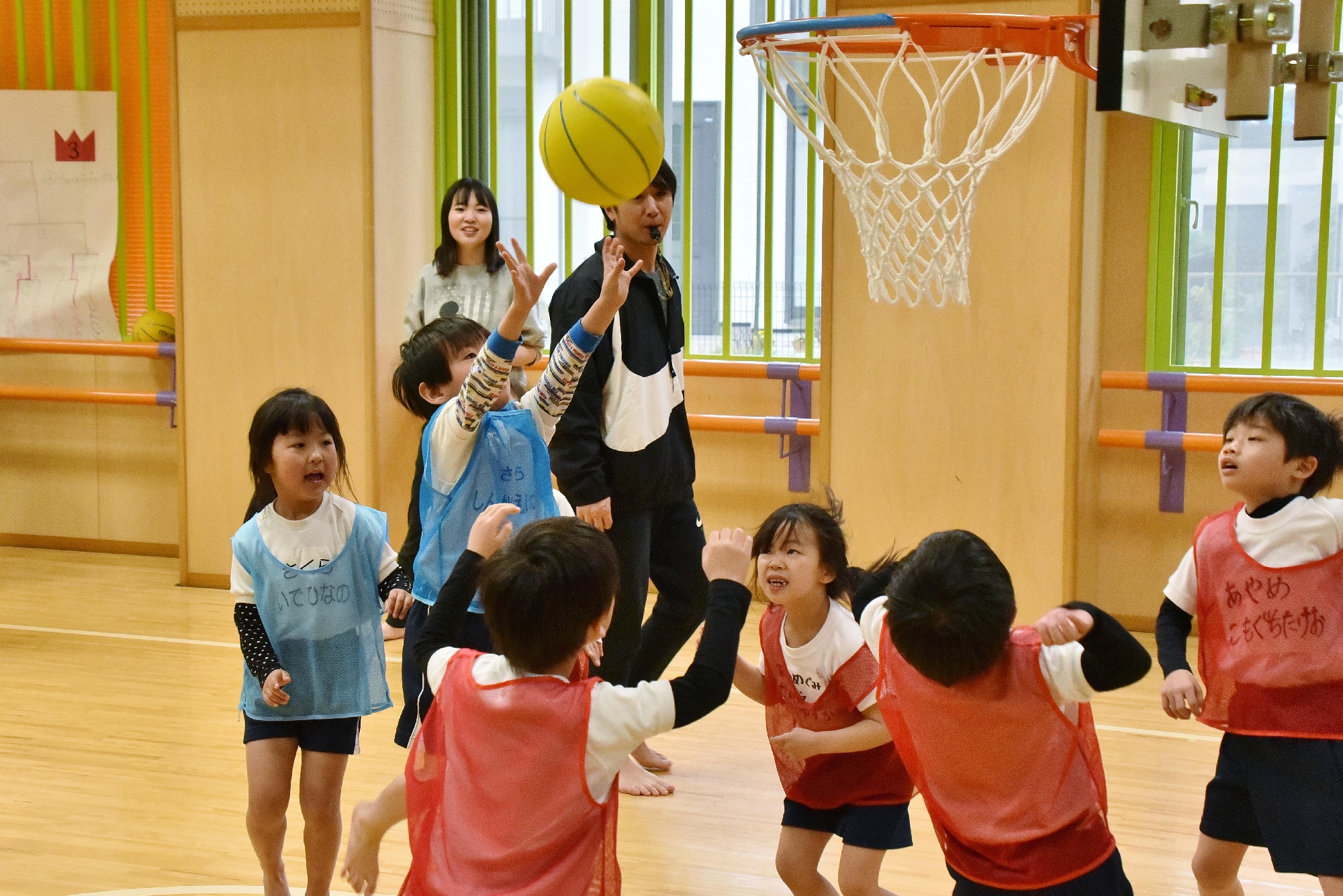
温水プール指導に加え年中からは、器械体操、ボール遊びなどを中心とした体操の指導も始まります。運動能力の発達に加え、集団でのルールなども学んでいきます。
From Nenchu grade (K2), we start to have apparatus gymnastics and physical exercises such as ball playing to learn rules to play as a group.
From Nenchu grade (K2), we start to have apparatus gymnastics and physical exercises such as ball playing to learn rules to play as a group.
佐渡ヶ島お泊り会 Summer camp in Sado Island
毎年夏休み(7月後半)に、年長クラスと卒園児の小学生の子どもたちだけで佐渡島に行きます。めざすは佐渡の「メルヘンこばと」。3泊4日の大旅行!町田こばと幼稚園では年少クラスから、保護者の付き添いなしで遠足に行くなどして経験を重ねていきます。
町田こばと幼稚園では、自立したつよい心を育てる大切な機会として、遠足やお泊り会などの行事を位置づけています。のどかな田園風景に囲まれた幼稚園の宿泊施設「メルヘンこばと」でのお友達との合宿生活や、海水浴、金山見学、キャンプファイヤーなど様々な楽しい旅のイベントを通して、子ども達は自分で考え、自分で行動し、自分で乗り越える自律を実践します。町田駅に帰ってきた子ども達の誇らしげな表情に、子どもの大きな成長を実感なさる保護者の方が多いようです。
Every year during summer holidays, Nencho (K3) children (and few graduates) take a journey to Sado Island without parents. Destination is “Marchen Kobato”; the little house children stay for 3 nights and 4 days.
At Machida Kobato, we go on excursions without parents accompanies from Nensho grade (K1), and get some experience to be away from parents. We take the excursion and sleepover events as important opportunities for developing independence of children. Surrounded by the slow and quiet rural scenery, children experience to think themselves, take action themselves, and overcome problems themselves through staying and sharing together in “Marchen Kobato” with friends, and through events such as playing at the beach, visiting mine, campfire and etc.
Many parents get to realise the growth of children when they see children’s proud faces at the return to Machida Station.
町田こばと幼稚園では、自立したつよい心を育てる大切な機会として、遠足やお泊り会などの行事を位置づけています。のどかな田園風景に囲まれた幼稚園の宿泊施設「メルヘンこばと」でのお友達との合宿生活や、海水浴、金山見学、キャンプファイヤーなど様々な楽しい旅のイベントを通して、子ども達は自分で考え、自分で行動し、自分で乗り越える自律を実践します。町田駅に帰ってきた子ども達の誇らしげな表情に、子どもの大きな成長を実感なさる保護者の方が多いようです。
Every year during summer holidays, Nencho (K3) children (and few graduates) take a journey to Sado Island without parents. Destination is “Marchen Kobato”; the little house children stay for 3 nights and 4 days.
At Machida Kobato, we go on excursions without parents accompanies from Nensho grade (K1), and get some experience to be away from parents. We take the excursion and sleepover events as important opportunities for developing independence of children. Surrounded by the slow and quiet rural scenery, children experience to think themselves, take action themselves, and overcome problems themselves through staying and sharing together in “Marchen Kobato” with friends, and through events such as playing at the beach, visiting mine, campfire and etc.
Many parents get to realise the growth of children when they see children’s proud faces at the return to Machida Station.
食育について Food education
準備中です
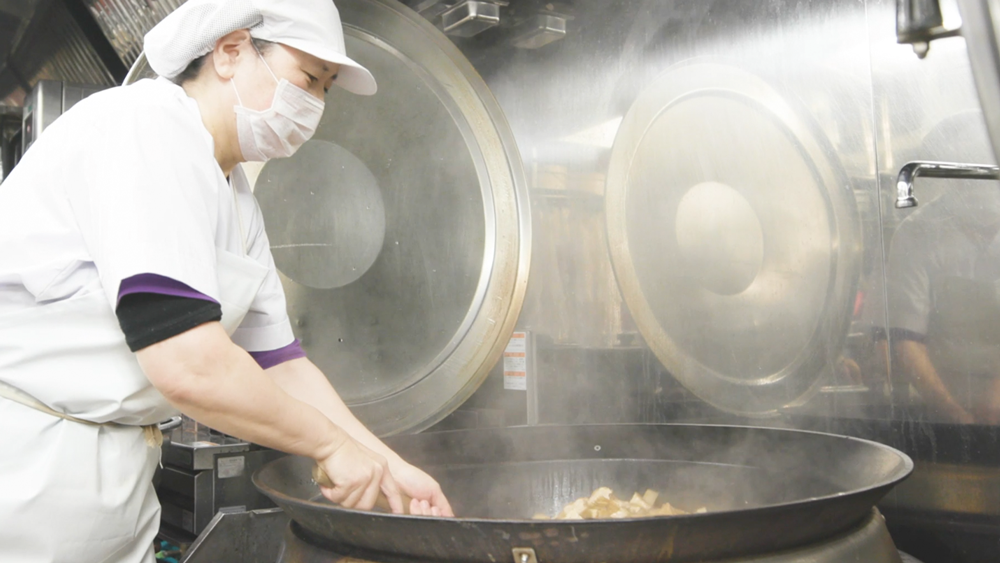
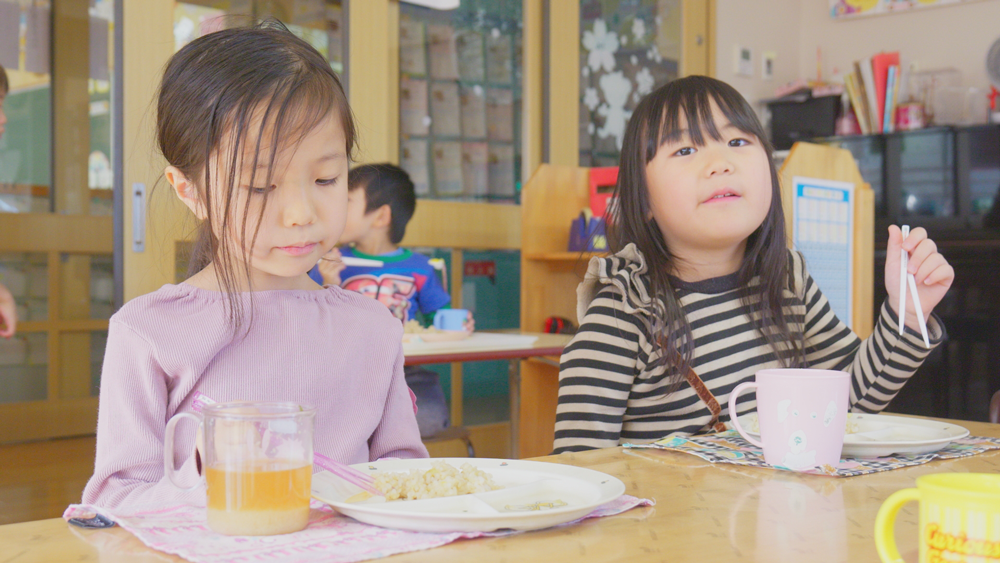
園生活の時程 Schedule
| 教育時間 School Operation Hours |
月曜日~金曜日 Mon-Fri |
|---|---|
| 平常時程 (給食有り) Regular operation Day (with school lunch) |
10時00分~14時00分 10:00 - 14:00 |
| 短縮時程 (給食無し) Shortened operation Day (No school lunch) |
10時00分~11時30分 10:00 - 11:30 |
| 土曜日(預かり保育のみ) Saturdays (Daycare only) |
8時00分~15時30分 8:00 - 15:30 |
平常時程 月曜日~金曜日
Daily Schedule - Full operation Day Mon - Fri
| 7:30 | 預かり保育 Daycare |
|---|---|
| 8:30 | 登園→自由遊び Arrival → Free Play |
| 9:30 | |
| 10:00 | 主活動 Main Activities |
| 12:00 | 給食 Lunch |
| 12:50 | 自由遊び Free Play |
| 14:00 | 主活動 Main Activities |
| 14:30 | 降園 Dismissal / Free Play |
| 18:30 | 預かり保育 Daycare |
短縮時程 (学期前後の約1週間)
Daily Schedule - Half operation Day [The first and the last week of each term]
| 7:30 | 預かり保育 Daycare |
|---|---|
| 8:30~ | 登園→自由遊び Arrival → Free Play |
| 10:00 | 主活動 Main Activities |
| 11:30 | 降園・自由遊び Dismissal / Free Play |
| 12:00~18:30 | 預かり保育 Daycare |
年間行事 Events
7月 July
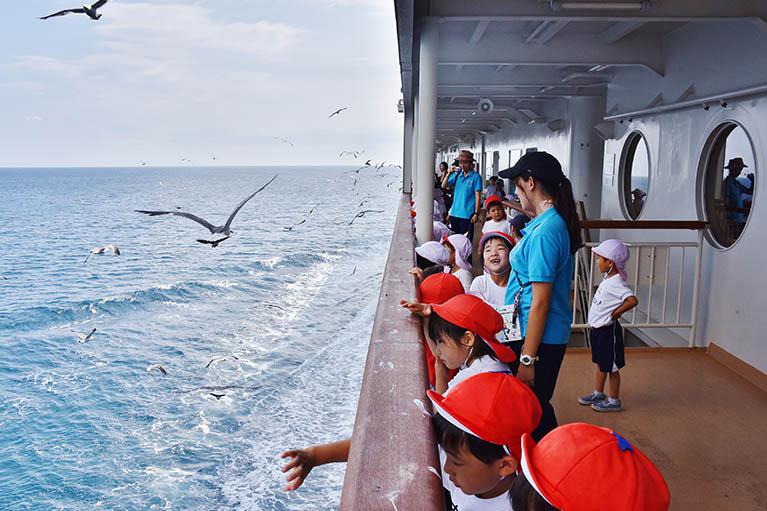
- 屋外プール使用開始
Outside pool begin - バーベキュー(給食最終)
BBQ (Last lunch for the term) - 短縮時程(給食無し)保育開始
Shortened Days (No lunch) begin - 年長・園内お泊り会
Sleepover at school (K3) - 1学期終業式
End of Term 1 Assembly - 夏期預かり保育開始
Summer Daycare begins - 年少中 夕涼み会
Cool off in the evening (K1, 2) - 年長 佐渡お泊り会
Journey to Sado (K3)
1月 Jan
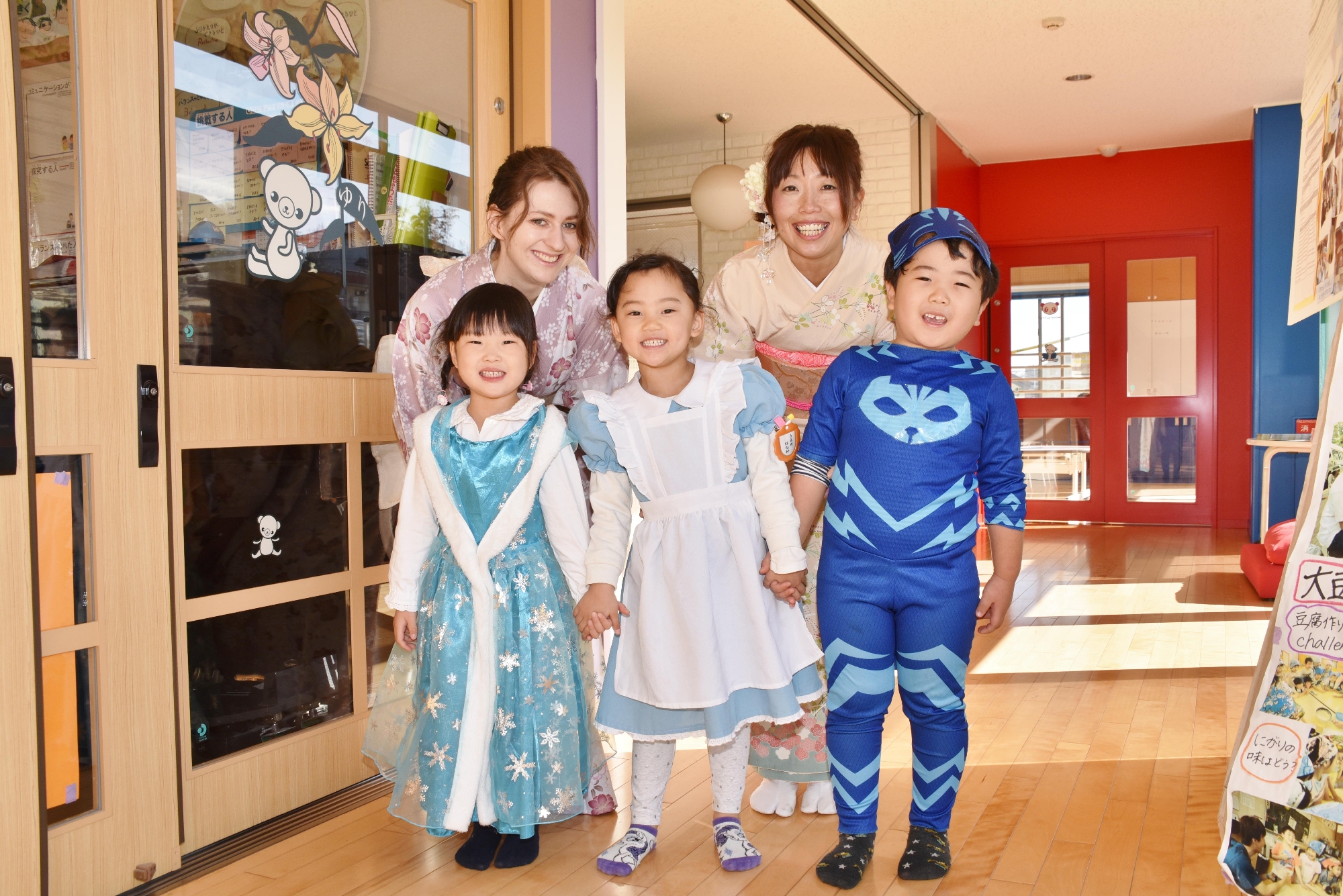
- 冬季預かり保育あり
Winter Daycare - 3学期始業式
Beginning of Term 3 Assembly - 卒園記念写真撮影
Photo Shoot for Graduation - 観劇会
Go to see Play at the theatre - 小正月
Koshogatsu Little New Year - 平常時程(給食有り)開始
Regular Days (Lunch) begin
※毎月誕生会を行っております。
※行事実施については、変更になる場合があります。
※七夕、クリスマス会等の行事は宗教的意味を持たず、子ども達が楽しむ行事として取り扱っています。
※詳細は毎月の「園のおたより(英訳はGoogleWorkspace内に毎月アップしています)」「クラスブログ」にてお知らせしております。
※毎月一度は避難訓練を行います。
※We have Birthday Assemblies every month
※Plans may change
※For events such as Tanabata and Christmas, we do not treat them as religious events but social events for children to enjoy.
※For more information, we issue monthly School Newsletter (English version is available in G suite) and Year Class Newsletter
※We have evacuation drills at least once a month
※行事実施については、変更になる場合があります。
※七夕、クリスマス会等の行事は宗教的意味を持たず、子ども達が楽しむ行事として取り扱っています。
※詳細は毎月の「園のおたより(英訳はGoogleWorkspace内に毎月アップしています)」「クラスブログ」にてお知らせしております。
※毎月一度は避難訓練を行います。
※We have Birthday Assemblies every month
※Plans may change
※For events such as Tanabata and Christmas, we do not treat them as religious events but social events for children to enjoy.
※For more information, we issue monthly School Newsletter (English version is available in G suite) and Year Class Newsletter
※We have evacuation drills at least once a month


